|
Pivotal World Series Moments
Two Cicotte Misplays Tip the Scales
1919 World Series Game 4: Cincinnati Reds @ Chicago White Sox
After losing both games in Cincinnati to start the best-of-nine series, the White Sox won Game 3 at home. So a Saturday crowd of 29,126 came to Comiskey Park to see their White Sox even the series behind their ace, Eddie Cicotte. Surely Game 1 in which he allowed six runs in only 3 2/3 innings was an aberration, and he would bounce back with a performance more befitting a 28-game winner.
What the public didn't know was that Cicotte had received $10,000 from gamblers to be part of a group of eight White Sox players who were throwing the series to the Reds. Lefty Williams, Chicago's second best hurler, had done his part by suddenly losing control in the fourth inning of Game 2 to help Cincinnati take a 3-0 lead on their way to a 4-2 victory.
Since some of the conspirators had not received their promised money, they decided to play Game 3 straight. The result was a 3-0 victory behind lefty Dickey Kerr, who was not part of the cabal.
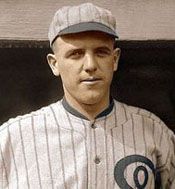 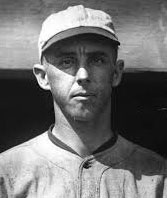 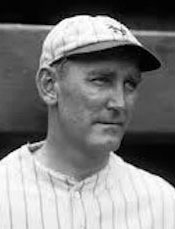 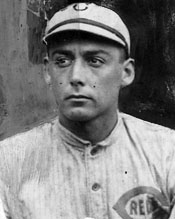 L-R: Eddie Cicotte, Lefty Williams, Jimmy Ring, Edd Roush Cicotte and Reds starter Jimmy Ring pitched scoreless ball in the first four innings. Then successive plays in the top of the fifth tipped the scales to the visitors. After CF Edd Roush was thrown out, LF Pat Duncan "smashed a hot one" just to the left of the pitcher's mound. One account of the game said that the ball Duncan hit "was headed for (SS Swede) Risberg when the little pitcher tried to stop it with his gloved hand. He deflected the ball away from him. He went after it, made a quick recovery and then threw wildly to first base, Duncan pulling up at second." The official scorer called it a two-base error, but many in the press box thought it should have been a single and an error.
SS Larry Kopf followed with a single. LF Joe Jackson, one of the conspirators, fielded the ball and "made a throw in the direction of the plate and Cicotte deflected the ball" toward the grandstand so that Duncan, who had held up at third, scored and Kopf ended up on third. The scorer gave Eddie another error on the play. The veteran hurler "went back to the box hanging his head. He tossed the ball nervously. He refused to face his crowd."
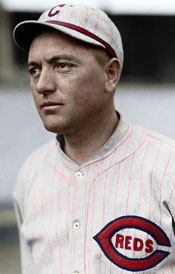 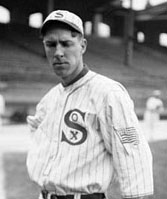 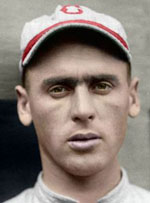 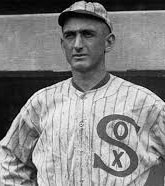 L-R: Pat Duncan, Swede Risberg, Larry Kopf, Joe Jackson The leader of the Black Sox, 1B Chick Gandil, wrote about Game 4 in his tell-all 1956 article in Sports Illustrated: "Both of the Cincy runs were scored in the fifth inning, partly due to two errors by Cicotte. One was probably my fault. Eddie fielded an easy roller and threw wide to first, permitting the runner to move to second. When the next batter singled to left center, and Jackson threw to the plate to try to cut off a run, I yelled to Cicotte to intercept the throw. I felt we had no chance to get the man at home but could nail the batter now trying to reach second. Cicotte juggled the ball and all hands were safe. The next man then doubled, and Cincy had both its runs." Accounts of the game the next day clearly state that Cicotte deflected the ball, not juggled it, but that is a minor discrepancy.
The next batter, RF Greasy Neale, a lefthanded batter, "took a healthy swing" at a 2-0 curveball and lofted a wind-blown fly over Jackson's head for a double. Kopf easily scored the second run of the inning. Cicotte retired the next two batters on sharp grounders to 2B Eddie Collins.
Cicotte led off the bottom of the inning for the White Sox amid "cheers and hoots" from the crowd. He grounded out.
Neither team got a runner past first base in the last four innings. So the Reds' two unearned runs in the fifth made the difference in giving Cincinnati a three-to-one lead in the Series.
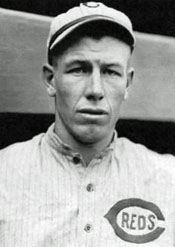 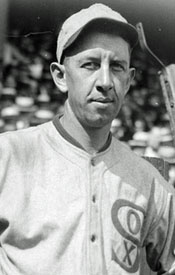 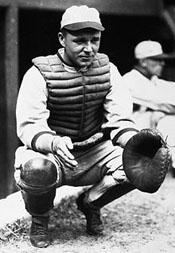 L-R: Greasy Neale, Eddie Collins, Ray Schalk Chicago manager Kid Gleason minced no words in summarizing the game. "They shouldn't have scored on Cicotte in 40 innings. ... There wasn't any occasion for Cicotte to intercept that throw. He did it to prevent Kopf from going to second. But Kopf had no more intention of going to second than I have of jumping in the lake."
In his nationally syndicated column, Christy Mathewson wrote of Game 4: "I couldn't help feeling a little sorry for old Eddie Cicotte after today's game. He was driven out of the opener defeated. He asked to be pitched back. When the game started, he worked with his oldtime cunning under a baking sun. Suddenly the wind changed and a cold breeze came up off Lake Michigan which probably chilled his old soup bone." Christy, who had been chronicling suspect plays, did not mark either of Cicotte's fifth inning errors as questionable.
Chicago reporter Hugh Fullerton, who compared notes with Mathewson throughout the series because of the fix rumors, also saw nothing suspicious in Game 4. "Eddie Cicotte, seeking revenge, attempted today to beat the Cincinnati Reds without help from his pals and as a result he has earned for himself the right to claim the hard luck world's championship. He refused to let his pals do the helping on the defensive and Jimmy Ring refused to let them help Cicotte on the offensive. The result was that the Reds shut out the White Sox in the best and hardest fought game of the series.
"There is no alibi for Cicotte. He pitched a great game, a determined game and one that would have won nine out of ten times, but he brought the defeat crashing down upon his own head by trying to do all the defensive work. He made the wild throw that gave the Reds their opening, the only real one they had, and he followed that up by grabbing at a ball thrown from the outfield and deflecting it past (C Ray) Schalk." Cincinnati won Game 5 to take a commanding four-to-one lead before the White Sox staved off elimination in Games 6 and 7. But Lefty Williams, who with his wife had been threatened by gamblers, lasted only 1/3 of an inning in Game 8 as the Reds romped 10-5 to win their first World Series.
|